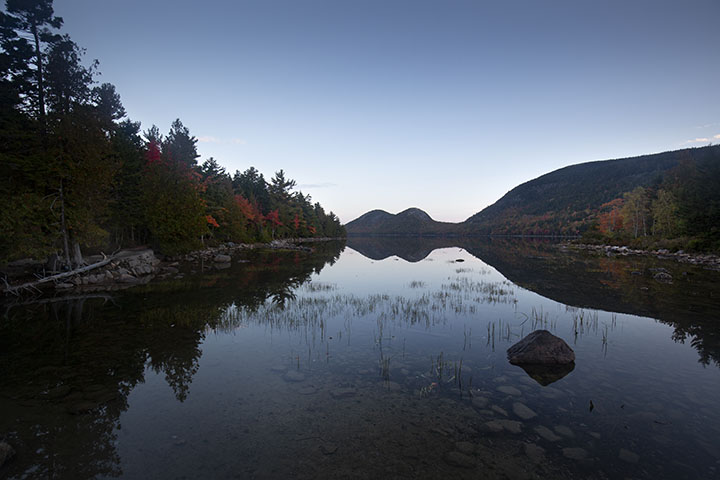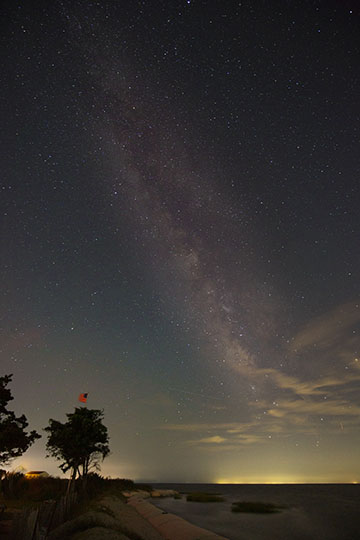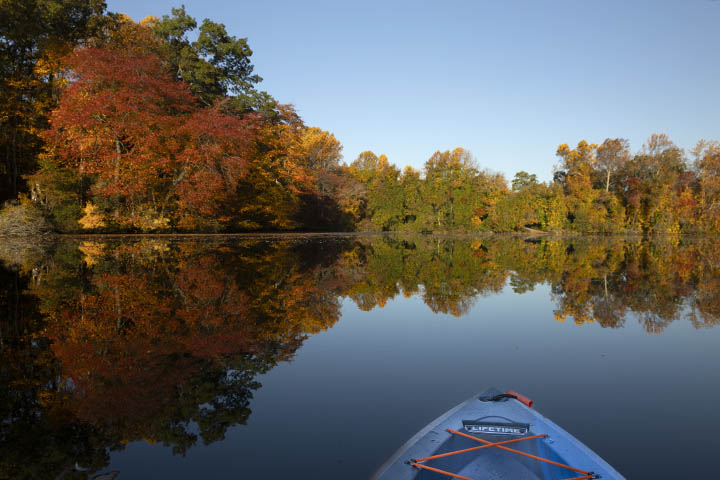Best Canon Wide Angle Lens
Best Choice FOR YOUR NEW CANON DSLR
WRITTEN BY: BRUCE LOVELACE
PUBLISHED ON: NOVEMBER 16, 2023
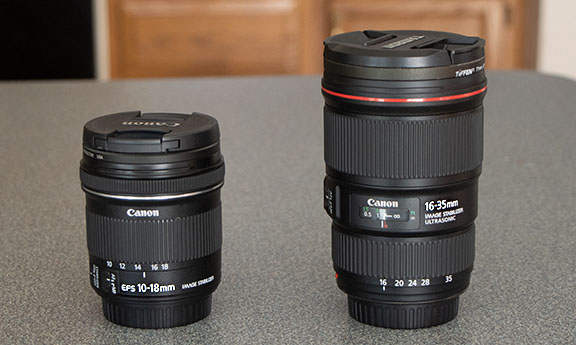 Super wide-angle zoom lens comparison.
Super wide-angle zoom lens comparison.The EF-S 10-18mm lens for APS-C crop cameras versus
the EF 16-35mm L lens for full frame Canons.
You want the best Canon wide angle lens, but don't know where to start. It can be like driving into a traffic roundabout circle and not knowing when to turn. This post article will help you decide the best direction to travel.
The two best Canon wide angle lenses are the 16-35mm focal length for full frame cameras and the 10-22mm focal length lens for APS-C Canon crop cameras. Both of these lenses give you great coverage for landscape photography,
You already have your kit lens, but you need to get a wider angle lens for your Canon. It's both good and bad that you have so many choices for getting the right wide angle lens. It's bad because it can be confusing on which lens is best for you. It's good because you know that a good lens is out there for you.
This article is going to help you with what you need to know. Here's the list below for the best Canon wide angle lens for both full frame and smaller APS-C crop Canon camera bodies.
Best Canon Wide Angle Lenses For APS-C Crop Cameras
The Canon EF-S 10-22mm f/3.5-4.5 is the best Canon wide angle lens for APS-C crop cameras. Although it does not have a robust range of focal lengths-most wide angle zooms don't-it's the right focal range for Canon APS-C cameras
It's also not particularly fast at f/3.5, but the 10-22 has a little more reach and is a little faster than the 10-18mm f/4.5-5.6.
The 10-18mm f/4.5-5.6 is a great introductory wide angle lens for photographers who are exploring super wide angle photography for the first time. Here are the top 5 EF-S sized wide angle lenses for Canon APS-C in the table below.
As an Amazon affiliate Canon Camera Geek receives a small commission from qualifying purchases, at NO added cost to you.
| CANON LENS | SIZE | FEATURES | PRICE |
| 1. Canon EF-S 10-22mm f/3.5-4.5 | Crop | Affordable. Good zoom range. 1/3 stop faster than the 10-18 f/4.5-5.6. Sharp with minimal distortions | Check Price |
| 2. Canon EF-S 10-18mm f/4.5-5.5 | Crop | This is the most affordable Canon super wide angle lens there is. Compact and light. Great for vlogging and landscape photography. | Check Price |
| 3. Rokinon EF-S 10mm f/2.8 Prime | Crop | It's not a Canon lens, but image quality and price make it worth considering. It's a non-zooming prime lens. This lens is manual focusing only, but depth of field is so great it's hard to miss proper focusing. | Check Price |
| 4. Canon EF 14mm f/2.8 Prime | Full | It's made for full frame, but still wide enough to use on a crop camera to get a decent wide view (22mm equivalent). Great for low light wide angle photos because of its fast f/2.8 maximum aperture. | Check Price |
| 5. Canon EF 11-24mm f/4L | Full | A top of the line super wide angle "L" lens that works great on crop and full Canon camera bodies. Outstanding image quality and an expected very high price tag. | Check Price |
Best Canon Wide Angle Lenses For Full Frame Cameras
The Canon EF 16-35mm f/4.0 is overall the best Canon wide angle lens in terms of value because of it performance and features compared to its price. The Canon EF 17-40mm L f/4.0 lens gets the top recommendation, as shown in the table below, because of its zoom range and it's price.
The 17-40mm lens is the most affordable of all the full frame wide angle lenses, but not necessarily the best. I chose the more expensive 16-35mm f/4.0 because of its modern design, optical quality, and affordable price.
As an Amazon affiliate Canon Camera Geek receives a small commission from qualifying purchases, at NO added cost to you.
| CANON LENS | SIZE | FEATURES | PRICE |
| 1. Canon EF 17-40mm f/4.0. | Full | An oldie, but goodie, this lens has been a favorite wide angle lens for dedicated Canon shooters for a long, long time. Longer zoom range than the 16-35mm and much cheaper price for an L lens. No image stabilization. | Check Price |
| 2. Canon EF 16-35mm f/4.0. | Full | I use this wide angle lens more than any other. Excellent image quality even in the corners for of full frame Canons at a cheap price compared to other lenses with similar focal length range. Weather sealed, fast focusing, and 4-stop image stabilization. | Check Price |
| 3. Rokinon AF 14mm F/2.8. | Full | It's not a Canon, but it has a lot of fans and it's affordable. Solid image quality for full frame Canons at a cheap price compared to Canon lenses with similar focal length range. Weather sealed, fast focusing. No image stabilization. | Check Price |
| 4. Canon EF 14mm f/2.8 Prime | Full | It's made for full frame, but still wide enough to use on a crop camera to get a decent wide view (22mm equivalent). Great for low light wide angle photos because of its fast f/2.8 maximum aperture. | Check Price |
| 5. Canon EF 11-24mm f/4L | Full | A top of the line super wide angle "L" lens that works great on crop and full Canon camera bodies. Outstanding image quality and an expected very high price tag. | Check Price |
NOTE: I did not include tilt-shift lenses in the table of wide-angle lenses abouve due to their specialized use, but if you want to shoot architecture, there is no better less than the 17mm TS-E. Here's the complete post. Canon Tilt-shift Lens.
For scenes like the one below where I want to include the foreground in the composition, I set my 16-35mm lens to its widest view setting of 16mm.
Read through this article and get the 3 main considerations you must know in order to make a smart, informed decision. Or, if you are in a hurry and want to skip all the background info and have the Canon Geek just tell you which one to get, then jump to the quick conclusion on the best Canon wide angle lens to get.
1. THE FIRST CHOICE TO MAKE, EF or EF-S.
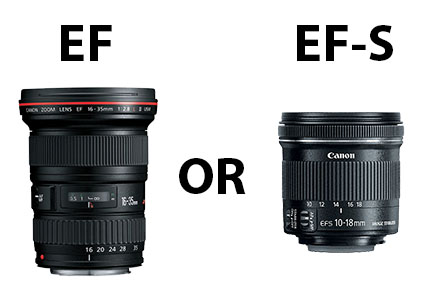 Canon EF versus EF-S Lens Choice
Canon EF versus EF-S Lens ChoiceWhen choosing the best Canon wide angle, the first way to narrow down your choices is to look at which camera lens format you want, a full-sized EF lens or a cropped size EF-S lens.
Here's how to pick getting either an EF-S lens or an EF lens.
EF WIDE ANGLE LENSES.
You must use an EF lens if you have any of the full frame cameras. Full frame cameras include the different versions of Canon 5D, 6D, and 1Dx series.
EF lenses are made big enough to handle the entire full-frame sensor. They're bigger, heavier, and more expensive. If you have one of the Canon Rebel cameras AND you will likely upgrade to a full frame camera in the future, then you also should start with one of the bigger EF lenses.
In general, professional EF lenses will produce better image quality than the EF-S lenses which are intended for photo enthusiasts.
You can also use an EF lenses on the smaller APS-C crop cameras. You just need to remember the 1.6x crop factor. For a more detailed explanation on the difference see my post on EF-S versus EF lenses.
EF-S WIDE ANGLE LENSES.
The EF-S lenses are made for and will only fit on the APS-C crop cameras, like the Rebels (t3, t3i, t4,t6, t7, t7i, t8, SL1, SL2, SL3) or one of the smaller Canon EOS DSLRs (70D, 77D, 80D, 90D)
Although there aren't as many of them, the EF-S lenses are very popular because of their lower price point.
EF-S lenses will not fit onto the larger full frame cameras mentioned above. Here's a video I made that will make the EF versus EF-S comparison even more clear.
2. Prime or Zoom Wide Angle
The second thing you want to decide on is whether you want the versatility of a wide angle zoom or you want the ultimate image quality of a wide angle (non-zooming) prime lens.
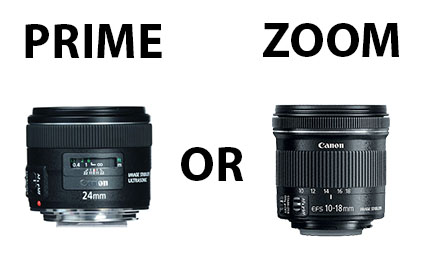 Canon Prime or Canon Zoom
Canon Prime or Canon ZoomPrime lenses are only a single focal length and usually give you the absolute best image quality.
Wide angle zoom lenses are more versatile because you can adjust the focal length and your composition by magnifying or reducing the angle of view. When a lens is designed to zoom, there are some compromises due to the properties of optics.
Certain defects such as chromatic aberrations, pincushion and barrel distortion, and loss of sharpness or contrast can become slightly more apparent with zoom lenses.
It's all a matter of your requirements and that's very subjective.
If you're like me, when you look at a photo taken with a wide angle lens you usually won't be able to tell if it was taken with a prime lens or a zoom lens.
3. Canon Wide Angle or a NON-Canon Wide Angle Lens
The third consideration to think about is if you prefer to buy a lens made by Canon or if you're okay with buying a compatible lens made by another lens company.
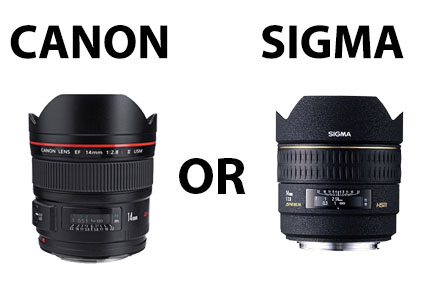 Should you stay loyal and stick with Canon?
Should you stay loyal and stick with Canon?Canon is not the only maker of lenses that fit your Canon DSLR. You can save money by going with another lens manufacturer like Tamron, Rokinon, or Sigma. It comes down to what you're comfortable with.
There are some Canon shooters who would never dream of using a 3rd party lens on their Canon camera. After all, Canon makes great lenses that will work with their great cameras, right?
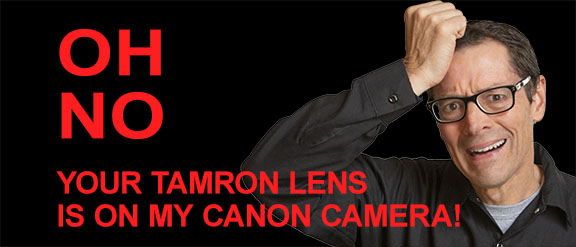 You can use a Tamron lens on your Canon camera.
You can use a Tamron lens on your Canon camera.Then there are other photographers that are heavily budget minded and are happy to go with any brand that will fit on their camera so long as it saves them money.
I'm located in between these 2 extremes, but I heavily favor (about 95%) using Canon lenses over other brands.
Specific wide angle lens photography
Within the realm of wide angle lens photography, there are specific applications for these lenses that might influence you choice for a decent wide angle lens. Let's take a look at the specific genres of photography where wide angle lenses are needed.
astrophotography
As soon as photography of the stars is mentioned wide angle lenses come to mind. Astrophotography is technically challenging and professional photographers invest in the very best lenses for their nighttime sky photography.
Faster wide angle lenses are the best, but you can take photos with slower lenses like I did in the Milky Way photo below.
The perfect Canon lens for astrophotography is the Canon EF 24mm f/1.4L II USM. It's a sharp prime lens and lets in 4 times as much light as an f/2.8 lens.
Because of its wide focal length of 24mm, this lens would be great for astrophotography with a full frame camera, but less than ideal in terms of its wide view with an APS-C Canon camera body because of the crop.
For crop cameras consider the super wide 14mm lens by Rokinon. It's manual focus only, but it's hard to find a lens this wide for APS-C cameras, fast, and very affordable.
Wide Angle Lenses For Landscape photography
Many of the Canon zoom lenses are good for landscape photography. I recommend a zoom lens over a prime lens so that you can explore a good variety of perspectives and different compositions easier than if you had a wide angle prime.
The kit lenses are wide enough to be considered adequate for shooting landscapes. I've used my EF-S 18-135mm lens on my APS-C crop 90D as well as my EF 24-105mm kit lens (See the photo below) with my full frame 5D Mark III with great success.
To get those wider, more scenic views of the world before you, I'd recommend the EF-S 10-18 f/4.5-5.6 for your crop camera. You don't need a fast lens for landscape photography. It's a great way for beginners to break into landscape photography. Here's the complete post on Canon Landscape Lenses.
For full frame Canon shooters, I like the old faithful EF 17-40mm L. It's likely been the best selling and most popular wide angle zoom that Canon has ever had. It has a little bit more versatility at the long end and can double up for other types of photography because of its 40mm longest focal length.
Canon wide angle lenses for vlogging
You're wondering what lens vloggers use and if wide angle lenses are good for vlogging. Vloggers use APS-C cameras and Canon's EF-S wide angle lenses are great for vlogging. Quiet real-time focusing is an important feature to have in your vlogging lens.
The wider view and deep depth of field (range of things in good focus) you get with a wide angle EF-S sized lens on a crop camera are good features to have for shooting video.
Canon EF-S 10-22 mm f/3.5-4.5 is a slight upgrade over the 10-18 f/4.5-5.6, but both lenses are good for vlogging.
Recommendations
I hope you found this post helpful to narrow down to the best choice in Canon wide angle lenses for YOUR situation. Here are my top two that I recommend as the best Canon wide angle lenses.
APS-C. If you have an APS-C "crop" camera, like one of the Rebels, or the 77D, 80D, or 90D, the best wide angle lens for you is the Canon EF-S 10-22mm f/3.5-4.5
There are "faster lens" available, but there is a steep increase in price to pay for those wide angle lenses with larger maximum apertures.
FULL FRAME. If you have a full frame Canon, like the 6D Mark II, 5D Mark III, or 5D Mark IV, the best wide angle for you is the Canon EF 16-35mm f/4.0. It take great photos and is good for your checking account.
Stay inspired. Shoot a Canon.

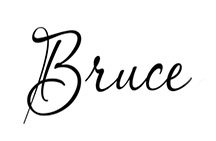
Bruce Lovelace is the publisher of Canon Camera Geek. Read more about him on the About Page. He also publishes how to articles and camera gear reviews at the Photography Tips website.
View some of Bruce's photos on Instagram and Flickr. Join the tribe of followers on YouTube. Bruce also runs photo workshops and provides 1 on 1 digital photography coaching.
Technical lens/camera matchup scores
Search for articles on this Site:
Recent Articles
-
Is the Canon G1X Mark II Sensor Still Good in 2026?-Specs & Real Value
Dec 22, 25 12:36 PM
Size matters. The big difference in this high-end point and shoot is the Canon G1X Mark II Sensor -
Canon 16-35mm f4 Sample Images. The Canon 16-35 Lens Sharpness Test
Dec 22, 25 10:51 AM
Canon 16-35mm f/4L IS Real-World Sample Images & Sharpness Review -
Choose the Right Memory Card for Your Canon R6 Mark II: Speed And Size
Nov 05, 25 02:04 PM
R6 Mark II Memory Card -
Canon G1x Mark II vs G1X-Side By Side Comparison of Canon G1X Cameras
Oct 22, 25 08:35 AM
G1 X Mark II vs. G1 X: Is the New Version a HUGE Leap... Or a Massive Mistake? Canon responded to the criticisms of the original G1X. Canon G1X Mark II vs G1X -
Sony RX100 III vs G1x Mark II by Canon. Side by Side Comparison
Oct 22, 25 08:07 AM
It's another one of those epic camera battles, this time not the Canon vs Nikon but rather the RX100 III Vs G1X Mark II battle. -
Canon R6 Mark II FAQ. Answers To All of Your Canon R6 M2 Questions
Sep 01, 25 07:51 AM
There's a lot you can easily learn about Canon's mirrorless R6 Mark II camera. Get your questions answered in this R6 Mark II FAQ
